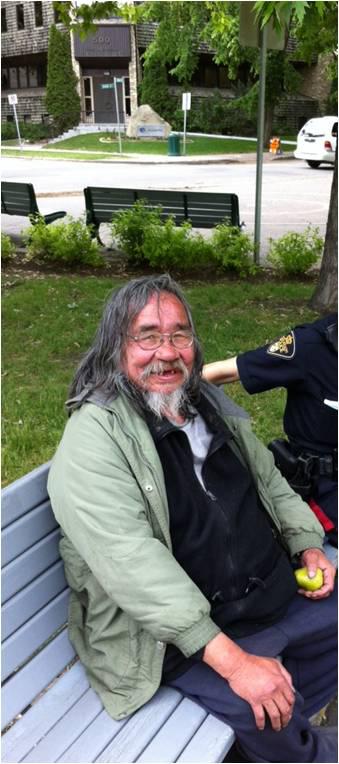Crime is Slate’s crime blog. Like us on Facebook, and follow us on Twitter @slatecrime.
On Friday, I wrote about Alvin Cote, a homeless Canadian drunk of First Nations descent who befriended much of the Saskatoon police department over the course of his more than 800 arrests for public drunkenness. Cote’s recent death hit the Saskatoon cops hard, prompting tears, memorials, and at least one heartfelt blog post in which a constable mourned his alcoholic friend. This wouldn’t have happened in an American city, I suggested. Whereas Canadians apparently love and revere their homeless drunks, Americans prefer to scorn them and escort them out of town.
Well, I’ve got egg on my face. As it turns out, escorting homeless people out of town is as popular in Saskatoon as it is in the States. An emailer alerts me to the practice of “starlight tours,” or “starlight cruises,” in which drunk or disorderly Aboriginal Canadians—people like Alvin Cote—were allegedly rounded up by Saskatoon police, escorted to the outskirts of town, and left to freeze to death. As a 2001 Amnesty International report put it, “There were reports that members of Saskatoon City Police had for a number of years had an unofficial policy of abandoning intoxicated or ‘troublesome’ members of the indigenous community away from the population centre of Saskatoon, thereby placing them at great risk of dying of hypothermia during the winter months.”
In 2000, for instance, a First Nations man named Darrel Night was allegedly handcuffed after leaving a party, driven out of town, and left on the roadside in sub-zero temperatures. “He called out for them to stop, afraid for his life. ‘That’s your fucking problem,’ was the only reply from the patrol car as it drove away,” reports Christopher Thrall in Vue Weekly. Night lived, but others weren’t as lucky.
While the two officers in the Night case were arrested and imprisoned, the Saskatoon police claimed that it was an isolated incident, and that “starlight cruising” was not departmental policy. Many locals disagreed, citing several suspicious freezing deaths in which the police may have had a hand. In 1990, a First Nations teenager named Neil Stonechild was found frozen to death in a Saskatoon field; Stonechild’s friend reports seeing a handcuffed, bleeding Stonechild in the back of a police car the night he disappeared, saying, “Help me. They’re going to kill me.” In the early 2000s, the Canadian government investigated the freezing deaths of four Aboriginal men in the outskirts of Saskatoon. While two of the deaths were deemed accidental, coroners’ inquests were “unable to determine the circumstances” that led to the hypothermia deaths of Rodney Naistus and Lawrence Wegner in the same area where Darrel Night was abandoned by police. At the inquest, two women testified that they saw Wegner in police custody the night he disappeared.
In 2003, new Saskatoon police chief Russell Sabo confirmed many locals’ suspicions when he admitted that, in 1976, an officer was disciplined for starlight-touring an Aboriginal woman. In a television interview, Sabo further admitted that starlight tours had “happened more than once, and we fully admit that and, in fact, on behalf of the police department, I want to apologize. It’s quite conceivable there were other times. I think it’s important we take ownership when we do something wrong and correct the behavior.”
As far as I can tell, there haven’t been any new starlight cruises reported since the Night case made headlines. Does this sordid history detract from the specific story of Alvin Cote, beloved First Nation inebriate? Not necessarily. The Cote story remains a lovely testament to the virtues of human kindness. But it just goes to show that kindness to one drunk doesn’t necessarily mean kindness to all drunks. And it should remind us not to allow the stories of police work at its best to make us forget the stories of the police at their worst.
